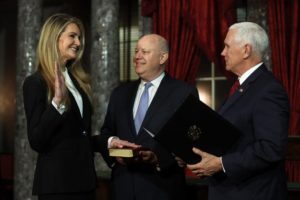When the Chairman and CEO of a Fortune 500 NYSE-listed company is charged with insider trading, complicated by the fact that he is a substantial financial contributor to the political party in power, it’s usually a significant financial new story.
But, that not what happened when Jeff Sprecher, founder, Chairman, and CEO of Intercontinental Exchange, Inc. (NYSE: ICE) who is also the Chairman of the New York Stock Exchange, was charged by the U.S. Justice Department and SEC, with insider trading.
When the chairman of the NYSE is tainted in an insider trading scandal, he should be forced to resign.
And, to make matters worse, Sprecher’s wife is Georgia Republican Senator Kelly Loeffler. She also was charged with passing along information she received as part of a confidential security Senate briefing on the impact of the COVID virus.
Loeffler, 49, is involved in a tight Senate run-off race in Georgia against the Democratic candidate, Rev. Raphael Warnock, that will determine whether the Democrats or Republicans control the Senate after Biden assumes office. The run-off election will be held on Jan. 5, 2021.
The Bill Barr Justice Department, no stranger to being used for political purposes, dropped the insider trading charges against Loeffler and three other senators in May 2020.
Then, the financial press ignored the event.
But the story was not over.
Sprecher, age 65, is Chairman and CEO of the Intercontinental Exchange (ICE), a Fortune 500 company. He has been Chairman of ICE since 2000.
The fact that Sprecher was named in an insider trading scheme by the SEC, the ultimate compliance department of the NYSE, shows how serious the charges are and why this historic event should be a significant corporate governance and P.R. problem for the NYSE, the world’s premier stock exchange, and the symbol of American capitalism.
The Accusations Against Sprecher and Loeffler
In the Justice Department charges against the couple, the agency said Loeffler and Sprecher “sold millions of dollar’s worth of stock from late January through mid-February (2020), including transactions in shares later affected by the global pandemic,” according to Reuters.
The Atlanta, Georgia couple is worth at least $500 million. Loeffler is now named the wealthiest US Senator.
Both Sprecher and Loeffler have denied wrongdoing. In a terse, 179-word press release issued March 20, 2020, the ICE said the trades did not involve any ICE securities and “were executed by their financial advisors without Mr. Sprecher’s or Senator Loeffler’s input or direction.” That’s it. They claim the advisors made the trades, and that they were in compliance with SEC Rule 10b5-1.
The nuances of Rule b5-1 prevented the SEC from charging the couple, there were two other problems related to the trades:
- The perception of impropriety from the NYSE Chairman’s actions. The NYSE is the symbol of American capitalism and the most recognized exchange in the world. How can its exchange chairman even give the impression he is using esoteric information, combined with the sale of his own company’s (ICE) stock to make money?
- The corporate PR statement from ICE does not exactly match the facts as to the sale of ICE stock by the couple.
Here are the Details
A report in The Daily Beast said that on March 19, 2020, Loeffler sold millions of dollars in stock within days of attending a February 24 Trump administration briefing on the COVID virus.
On the same day as the Senate Health Committee’s private session on the COVID virus, Loeffler reported a sale of stock owned jointly with Sprecher.
“In total, Loeffler and her husband conducted 29 stock transactions in late February. Perhaps the one that most drew attention was buying between $100,000 and $250,000 in Citrix’s technology company, which offers remote-working software. The software has become popular as people have transitioned to working from home during the pandemic, according to VOX.
Loeffler challenged the insider trading allegations in a March 20 tweet, saying that “neither she nor her husband makes decisions about her portfolio.”
But that story changed in early February when the Atlanta Journal-Constitution reported that Loeffler had sold off $18.7 million in stock in Intercontinental Exchange (ICE), where she formerly was an executive. “Those transactions — though large in value — don’t necessarily have an evident connection to the pandemic. But they drew scrutiny because, as the New York Times reported, they hinted at an unusual compensation scheme from her former employer,” VOX said.
In a separate account, the Atlanta Journal-Constitution also found “the largest transactions in the SEC charges — and the most politically problematic — involve $18.7 million in sales of Intercontinental Exchange stock in three separate deals dated Feb. 26 and March 11, 2020. Loeffler is a former executive with ICE, and her husband, Jeff Sprecher, is the CEO of the company, which owns the New York Stock Exchange among other financial marketplaces.
“During the same period reflected on reports, the couple also sold shares in retail stores such as Lululemon and T.J. Maxx and invested in a company that makes COVID-19 protective garments. The Atlanta Journal-Constitution got the first look at these reports, covering mid-February through mid-March and shedding new light on Loeffler’s financial transactions during the pandemic. Previous reports — which have put Loeffler in the national spotlight — covered her trading during the first six weeks of 2020.”
Here Is Why This is a Problem for the NYSE
The CEO and Chairmen of publicly-traded companies are not supposed to attract the SEC’s attention, let alone be charged with the severe violation of insider trading.
Sprecher himself violates a few NYSE rules.
- NYSE Rule 2010. Standards of Commercial Honor and Principles of Trade states: “A member or member organization, in the conduct of its business, shall observe high standards of commercial honor and just and equitable principles of trade.”
- NYSE Rule 303A.10 Code of Business Conduct and Ethics. The commentary for this Rule says: “No code of business conduct and ethics can replace the thoughtful behavior of an ethical director, officer or employee. However, such a code can focus the board and management on areas of ethical risk, provide guidance to personnel to help them recognize and deal with ethical issues, provide mechanisms to report unethical conduct, and help to foster a culture of honesty and accountability.
- Under this same Rule, the NYSE says: “Conflicts of interest. A “conflict of interest” occurs when an individual’s private interest interferes in any way – or even appears to interfere – with the interests of the corporation as a whole. A conflict situation can arise when an employee, officer, or director takes actions or has interests that may make it difficult to perform his or her company work objectively and effectively. Conflicts of interest also arise when an employee, officer or director, or a member of his or her family, receives improper personal benefits as a result of his or her position in the company.”
- This same Rule covers insider trading and says: “compliance with laws, rules, and regulations (including insider trading laws). The listed company should proactively promote compliance with laws, rules, and regulations, including insider trading laws. Insider trading is both unethical and illegal, and should be dealt with decisively.”
- The NYSE is a Designated Self-Regulatory Organization (DSRO), which regulates itself with almost no interference from the SEC, except in extreme circumstances. How secure is the NYSE’s self-surveillance system be when its Chairman is charged with insider trading?
- What role did the millions in Republican contributions play in the treatment the SEC gave Sprecher and his wife, Georgia Senator Kelly Loeffler, a Republican?
Too Many Coincidences
The insider trading charges against Loeffler were dropped by the Republican-controlled Senate Ethics Committee and the SEC, headed by Jay Clayton, a Trump appointee. Clayton said he would leave the SEC in December 2020. 
During Clayton’s tenure, NPR reported that the SEC brought just 32 insider-trading enforcement actions last year, the fewest since 1996. Loeffler, Sprecher, and a few other Senators have escaped this insider trading enforcement net.
In a related SEC investigation into insider trading based on the same confidential security briefing Loeffler attended on the COVID crisis, Sen. Richard Burr (Republican-North Carolina) resigned from his post as Chairman of the Senate Intelligence Committee as part of a separate COVID insider trading scheme.
Loeffler Has Political Problems, Not Financial Ones
Sprecher’s wife, Kelly Loeffler, is in a heated election against a Democratic candidate, Raphael Warnock, in a very politically-charged campaign. In her campaign, Loeffler said of Warnock, her Democratic opponent: “He has supported Marxist ideas. He has embraced communists,” she told a mask-optional crowd indoors here on a sunny day, drawing boos.
“Warnock responded Thursday, telling reporters that Loeffler “sits down for interviews with known white supremacists, and she gleefully accepts the endorsement of a candidate who traffics in the QAnon conspiracy that is rife with hatred and bigotry,” according to NBC News.
As the husband of a political candidate in the Trump era, it’s appropriate to ask how any of these charges, regardless of their validity, reflect the opinions and behavior of Sprecher? Is Sprecher a QAnon follower, or is he sympathetic to white supremacists? Are these even questions the CEO of a Fortune 500 company should even be asked?
Remember Martha Stewart: Another CEO Convicted of Insider Trading?
The Sprecher-Loeffler insider trading charges also bring back memories of the SEC’s insider trading case involving Martha Stewart, then Chairman and Chief Executive Officer of Martha Stewart Living Omnimedia, Inc.
In that case, the SEC found that Stewart committed illegal insider trading when she sold stock in a biopharmaceutical company, ImClone Systems, Inc., on Dec. 27, 2001, after receiving an unlawful tip from her stockbroker. Both were indicted and convicted.
At that time, Stephen M. Cutler, the SEC’s Director of Enforcement, said: “It is fundamentally unfair for someone to have an edge on the market just because she has a stockbroker who is willing to break the rules and give her an illegal tip. It’s worse still when the individual engaging in insider trading is the Chairman and CEO of a public company.”
The NYSE’S Previous Problem With A Bad Executive Officer
Charges of financial misconduct and other trading irregularities are rare at the NYSE, but they have happened before and in very public ways.
In 1933, President Franklin Delano Roosevelt met with Richard Whitney, Chairman of the NYSE. At that meeting, Roosevelt told of the need for “moral reform of Wall Street,”

including the need for the NYSE to adopt a code of ethics that could be adopted by the nation’s other stock exchanges. Whitney was a Harvard graduate, had a blue-blood ancestry, and was a senior member of JP Morgan.
Unfortunately, after that meeting, Whitney showed he was not concerned about the “moral reform of Wall Street.” In 1938, Whitney was “exposed as the embezzler of funds entrusted to him by the stock exchange and the New York Yacht Club, of which he was treasurer. He also misappropriated funds from his father‐in‐law’s estate. Then, the one‐time hero of Wall Street was sent to Sing Sing Prison,” according to this article in the New York Times.
Those are the type of problems Loeffler’s and Sprecher’s insider trading problems raise.
It also raises the conflict-of-interest and crony capitalism problems that are embedded in the entire Trump administration.
Rich corporate and individual donors who deal with the Trump administration by making multi-million-dollar contributions expect something in exchange. There is nothing altruistic in Trump’s world. All the quid pro quo donations are being made in the open.
Sprecher Should Resign from Intercontinental
Sprecher is Chairman of a public company that owns the NYSE, the world’s pre-eminent stock exchange, where “a man’s word is his bond.” People have been fired there for even the appearance of impropriety, so why does Sprecher still have his job?
Worse, what’s the connection between his million-dollar contributions to the Republican Party in the Trump era, and what did he expect in return for making those contributions?
Oddly, in the 2020 ICE annual report, the Chairman’s message signed by Sprecher says: “At our core, we bring transparency to global markets. Transparency drives greater efficiency, encourages broader participation, and levels the playing field. Transparency has the power to transform markets, something we’ve seen again and again as our company had grown since our founding 20 years ago.”
Transparency is excellent, as long as it is visible. 
Sprecher doesn’t believe in transparency, at least as far as his behavior is concerned, and in what he expects to receive in exchange for his large personal political donations to Republican candidates.
Sprecher also built his company, ICE, as a “monetization” machine. For those who aren’t familiar with monetization, it’s the process of charging for anything that was free or too cheap before and, in the exchange business, that includes trading and mortgage data and all forms of clearing processing and any new revenue centers that can be created from software fees.
The main purpose of selling data is to give top tier traders an edge, or advantage, against other traders who don’t get the data or don’t get it fast enough. This mindset also includes information that others do not yet have. This is the logical link to insider trading.
It is impossible to think that the CEO who is now worth about $500 million does not know the benefit of preferential information and how that information can be monetized. When you combine that with huge political contributions to the Republicans who control the Justice Department and SEC, it’s naïve to think that crony capitalism will not come to the rescue in a time of need.
Voters in the upcoming Georgia Senate race should keep this in mind. Crony capitalism takes precedence over your state and local needs when it is being managed by people who want to monetize and profit from everything.












[…] (To see the details about the trading involved and how the trading discrepancies, see the article here on this site.) […]
[…] an article on his site, Epstein said Sprecher violated a few NYSE […]
[…] (To see the details about the trading involved and how the trading discrepancies, see the article here on this site.) […]